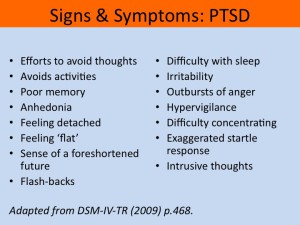When people think of the costs of war, they usually think of the physical and material costs. They think of the bodies that have been shattered and the lives that have been snuffed out. They think of the money that goes towards paying for the conflict and how it affects their lives through possible rationing and minor inconveniences. Up until recently, they never thought about those returning from the fight and how their experiences are leading to shattered families, broken hearts, and more and more frequently, murder and suicide. Veterans returning home are facing higher and higher rates of PTSD, leaving local mental health providers totally overwhelmed and unsure of how to help.
Currently, it is though that around 22 veterans kill themselves every day. That means that 22 men and women who have fought and survived combat, survived having someone else try to take their life, return home and end up taking their own lives for a myriad of reasons. With local providers so overwhelmed and unable to help, local around the country are taking it upon themselves to do what they can. This has lead to the creation of a large number of local charities specializing in helping veterans readjust to civilian life and get the mental and physical support they need to reintegrate into their previous lives with their families and friends. One of the major issues that these charities are trying to overcome is the stigma so many veterans feel about PTSD and asking for mental help.
One of these groups goes by 22Everyday Task Force and has branches spreading all around the country, raising their own funds and working independently from each other to support those in their communities as best as possible. The 22Everyday groups are made up of both civilians and veterans, giving those they help comfort in the fact that they’re dealing with people who have gone through this themselves or, at the very least, are intimate with the chaos PTSD can cause. Many of the 22Everyday members have also lost loved ones to suicide or PTSD-induced crimes, allowing for further connections to be made. With an emphasis on suicide education, prevention, and awareness, 22Everyday isn’t simply limiting itself to helping veterans in need, they want to work with everyone. This is just one example of locals working together to help returning soldiers and hopefully, it won’t be the last.
If you’d like to read more, the link is here.